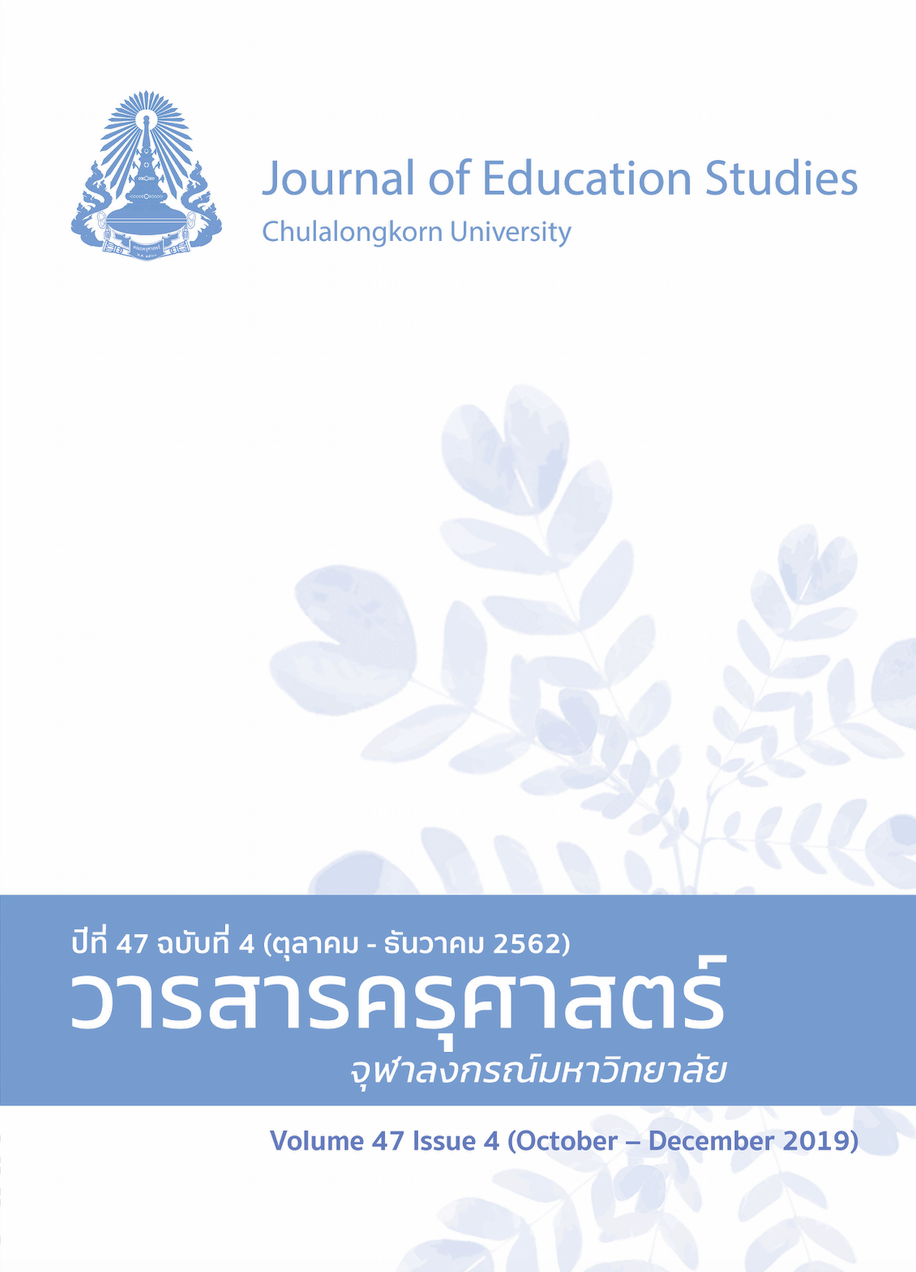Authentic Assessment of Learning Outcomes Based on Thai Qualification Framework for Higher Education (TQF) For the Bachelor's Degree in Education Program
Keywords:
AUTHENTIC ASSESSMENT, LEARNING OUTCOME BASED ON QUALIFICATION FRAMEWORK, BACHELOR'S DEGREE, EDUCATION PROGRAMAbstract
This research was aimed at constructing and developing the assessment framework, constructing and validating the quality of the instruments, and setting up the assessment criteria, including studying the results of use the assessment, along with the learner’s authentic conditions in line with the Thai Qualifications Framework for Higher Education (TQF) for an undergraduate degree program in Education. The sample used for the study included 1st – 4th year undergraduate students enrolled in the 1st semester of the 2017 academic year. Instruments used included 2 questionnaires, evaluation by experts, and the use of a questionnaire to check the validity of the authentic assessment framework. The data were analyzed with content analysis, percentages, and means. As the results of the research, a framework was developed for assessing student learning guidelines for authentic assessment of the lecturer, reflecting the relationship between objectives set for the instruction and learning standards set in the course description (TQF .3) including the relationships between the learning evidence, instruction, and evaluation based on the objectives set. In addition, the instruments and criteria for assessment were developed along with the assessment framework. In evaluating the results of using authentic assessment framework, it was found that it was possible to effectively assess the students’ learning in every course by applying the learning standards set in every aspect of TQF 3. In general, most students had learning achievement measured at very good to excellent levels.
References
ชัยพฤกษ์ เสรีรักษ์ และ คณะ. (2542). คู่มือการประเมินผลโดยใช้แฟ้มผลงานดีเด่น. กรุงเทพฯ: สถาบันพัฒนาคุณภาพวิชาการ (พว.).
ทิวัตถ์ มณีโชติ. (2549). การวัดและประเมินผลการเรียนรู้ตามหลักสูตรการศึกษาขั้นพื้นฐาน. กรุงเทพฯ: สำนักพิมพ์ศูนย์ส่งเสริมวิชาการ.
ธนสาร บัลลังก์ปัทมา. (2555). การออกแบบการเรียนรู้แบบ Backward design (2). สืบค้นจาก https://www.gotoknow.org/posts/224435.
ฤตินันท์ สมุทร์ทัย. (2558). การวิจัยเพื่อพัฒนาการเรียนรู้. เชียงใหม่: ครองช่าง พริ้นท์ติ้ง.
วนิดา สาระพางค์, นวลพรรณ วรรณสุธี, และ กฤธยากาญจน์ โตพิทักษ์. (2558). การพัฒนาชุดเครื่องมือประเมินคุณลักษณะบัณฑิตด้านทักษะทางปัญญาตามกรอบมาตรฐานคุณวุฒิระดับปริญญาตรี หลักสูตรการศึกษาบัณฑิต (5ปี) โดยประยุกต์ใช้ทฤษฎีการสรุปอ้างอิงความน่าเชื่อถือของผลการวัด. ครุศาสตร์สาร, 9(2), 59-66.
ศิริชัย กาญจนวาสี. (2544). ทฤษฎีการทดสอบแบบดั้งเดิม (พิมพ์ครั้งที่ 4). กรุงเทพฯ: โรงพิมพ์แห่งจุฬาลงกรณ์มหาวิทยาลัย.
ส. วาสนา ปวาลพฤกษ์ และ คณะ. (2543). ระบบการวัดและประเมินผลผู้เรียนระดับอุดมศึกษาตามแนวพระราชบัญญัติการศึกษาแห่งชาติ พ.ศ. 2542. กรุงเทพฯ: ห้างหุ้นส่วนจำกัดอรุณการพิมพ์.
สุขุมาล หวังวณิชพันธุ์. (2561). มคอ.คืออะไรในการจัดการศึกษาระดับอุดมศึกษา. สืบค้นจาก http://blog.rmutp.ac.th/sukumal.w/2018/03/30
เอกรินทร์ สี่มหาศาล และ สุปรารถนา ยุกตะนันทน์. (2546). กระบวนการวัดและประเมินผลตามหลักสูตรการศึกษาพื้นฐาน พุทธศักราช 2544. กรุงเทพฯ: บุ๊ค พอยท์.
อุทุมพร จามรมาน. (2540). การตีค่าความสามารถที่แท้จริงของผู้เรียนเพื่อการปฏิรูปการศึกษา. กรุงเทพฯ: ฟันนี่พับลิชซิ่ง.
ภาษาอังกฤษ
Fasko, D. J., & Grubb, D. J. (1997). Implications of the learner–centered battery for new teacher standards and teacher education reform in Kentucky. New Jersey: Prentice–Hall.
Ross, J. A., Rolheiser, C., & Hogaboam–Gray, A. (1998). Student evaluation in co–operative learning: Teacher conditions. Teachers and Teaching: Theory and Practice, 2(4), 299–316.
Wiggings, G. (1989). Teaching to the (authentic) test. Education Leadership, 46(7), 141-147.




